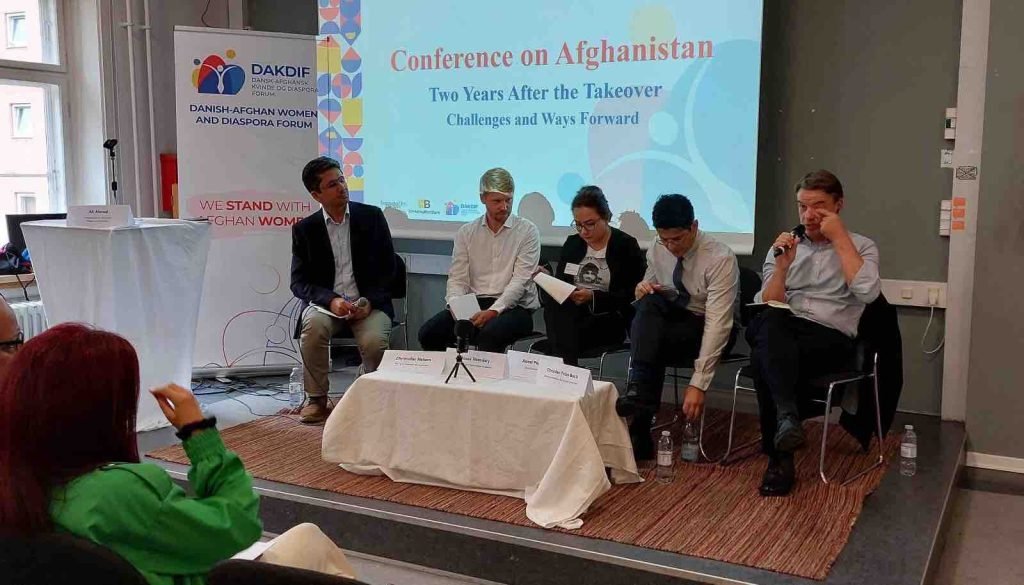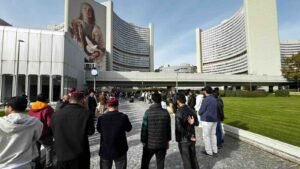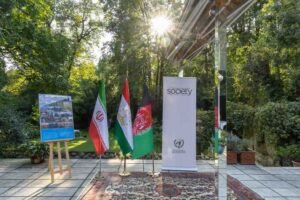Reflecting on Two Years of Taliban Rule: Charting a Path Forward for Afghanistan’s Multi-Faceted Challenges

From right to left, Christian Friis Bach - director of Warfair Trading and MP in Danish Parliament, Aemal Peroz, Migration Researcher based in Sweden, Hossa Secondary-Macpheson, social entrepreneur based in Scotland, Christoffer Melson from the Liberal Party in the Danish Parliament, and Ali Ahmad served as moderator. Photo: @Mikael Nielsen
By Ali Ahmad
The Danish-Afghan Women and Diaspora Forum (DAKDIF) organized a conference on the 30 July 2023 in Copenhagen, Denmark, to analyze the two years of Taliban rule in Afghanistan and examine the difficulties that lie ahead. The meeting also discussed solutions for the numerous issues that the Afghan people are facing as a result of the de facto Taliban administration.
The United Nations special rapporteur on the situation of human rights in Afghanistan, Richard Bennett; a member of the Liberal Party in the Danish Parliament, Christoffer Melson; and a Danish parliamentarian and the director of Warfair Trading, Christian Friis Bach were among the speakers and panelists. Warfair sources products from countries such as Afghanistan that are embroiled in conflict to boost their economies, create jobs, and promote the emergence of peaceful societies. Heela Najibullah, an Afghan scholar on peace and reconciliation, as well as several members of the Afghan diaspora in Europe, spoke at the conference and served as moderators. The conference received financial support from the Danish Refugee Council (DRC) and assistance and collaboration in planning the conference was provided by Crossing Borders.
Two Years of Taliban Rule in Afghanistan: Assessing the Challenges Ahead
In his opening remarks at the conference, Mr. Bennett reflected on the difficulties faced two years after the Taliban’s takeover and emphasized the significance of elevating Afghan voices in his capacity as a special rapporteur and tackling the human rights crisis brought on by the Taliban’s regressive policies. He accused the Taliban of breaking their promises to bring about reform, which resulted in extensive human rights abuses that disproportionately targeted women, girls, and minorities. Mr. Bennett claims that since the Taliban’s return two years ago, the social environment for women and girls has gradually become more restrictive. There are over 60 decrees which the Taliban leader has issued that limit the rights of women. Mr. Bennett was shocked to learn that, despite the Taliban’s assurances that they would not impose restrictions on the private sector, beauty salons were shut down in July. Mr. Bennett claims that the Taliban’s intention to shut down some of the few remaining sources of joy for women is evident from the closure of beauty parlors. His perspective highlights the Taliban’s misogynistic behavior and demonstrates their resolve to stifle any type of enjoyment in women’s lives.
While a humanitarian crisis is imminent, Mr. Bennett maintained that Afghanistan’s predicament is also a political and human rights one. Although he insisted that humanitarian help must continue, he issued a warning against any cuts in aid that would endanger the Afghan people. However, he recommended tougher methods to guarantee that aid is not misdirected and reaches those who are most in need. Mr. Bennett not only highlighted the significance of acknowledging the Afghan situation alongside other global issues such as the conflict in Ukraine but also underscored Europe’s responsibilities in resolving the Afghan dilemma.
Mr. Bennett stated that political engagement is crucial in addition to humanitarian relief because the crisis has ramifications that extend outside the borders of Afghanistan, including terrorism and immigration. If Europe believes the issues will be resolved within Afghanistan, it is mistaken. Mr. Bennett suggested a strategy for progress that supports the peace process, lowers breaches of human rights, and works to create an inclusive government. He underlined the significance of handling the crisis with fortitude and tenacity to persevere through the difficulties of the moment and build a better future.
Ms. Najibullah, the keynote speaker of the conference, dispelled many misconceptions about Afghanistan under Taliban rule, such as it was safe, peaceful, and culturally restricted for women. She claimed that considering Afghanistan lacks a formal government and the rule of law, it is neither safe nor peaceful, which has an effect on regional and global stability. She thinks that the stability and security of the region are threatened by the lack of a genuine administration. Since the Taliban took control, there has been less bloodshed, but this is only because the Taliban, the terrorist organization that instigated the carnage, is now in power. In contrast to Afghanistan’s progressive past, the absence of the rule of law in the Taliban regime has encouraged extremism, as seen by the growth of religious madrassas, the training of suicide bombers, and changes to the educational curriculum.
To achieve enduring peace, Ms. Najibullah underlined the importance of taking a holistic approach to meet the concerns of all Afghans. She claimed that international cooperation is necessary given Afghanistan’s geopolitical situation. Protecting Afghans’ rights, promoting communication, and not tolerating the Taliban’s rule are all part of engaging with the Taliban. Ms. Najibullah reiterated the significance of wiping out the Cold War-era Jihad narratives to ensure human security globally. To stop radicalization, she advocated that all Afghans must have access to food, healthcare, and education. To preserve regional stability and global security, an agreement on Afghanistan’s political future is required at the national and international levels.
For lasting peace, “a comprehensive and inclusive approach is required to address the concerns and aspirations of all Afghan people,” Ms. Najibullah said. “Our national interest, regional, and global security demand that Afghanistan declares itself a neutral state, leading to consensus among regional and international political stakeholders under the United Nations’ umbrella,” demanded Ms. Najibullah.
Panel 1: Mainstreaming Aid: Human Rights and Gender Equality in Afghanistan
The discussion highlighted the complex issues surrounding Afghanistan’s current state and the challenges it faces in terms of human rights, gender equality, and international intervention. The panelists stressed on the geopolitical dynamics and historical elements that contributed to the creation of terror groups such as the Taliban and their predecessors, the Mujahidin. They also accentuated the significance of gender mainstreaming, targeted aid delivery, and collaboration with Afghan women’s rights activists to ensure aid reaches those most in need, particularly in the current restrictive environment.
Mr. Bennett clarified the differences between the terms “gender apartheid” and “gender persecution” throughout the first panel. He looked at how these two terms are applied in the framework of international law. According to the Rome Statute, gender persecution is recognized as a crime against humanity in international law. Although gender apartheid is not explicitly defined on the grounds of race, it is seen as fitting the situation in Afghanistan, potentially holding the State responsible rather than individual perpetrators.
In response to the Taliban’s repression of women, Tahmina Salik, the chairperson of DAKDIF, stressed the need for gender mainstreaming. She suggested various cutting-edge strategies, like working with local female activists and using the internet. Online education, skill development, and collaboration with the private sector are crucial strategies, according to her. In a similar vein, Shogofa Ahmadzai, an Afghan-Swedish women’s rights activist who participated in the panel discussion, brought out the historical perspective and educational prospects for women in Afghanistan. She spoke in detail on how the geopolitical game and the Taliban’s extremism have affected women’s current status, notably in the field of education. Ms. Ahmadzai thinks that the Taliban’s current educational program encourages radicalization. She underlined that in order to establish a culture that is inclusive of girls, women, and minorities, donor policies must be well informed.
Wasil Faizi, an Afghan political activist on the panel said that the events of 15 August 2021 were not strategic failures but rather a foreseen process. “The Taliban came to power at the end of a very well-thought-out process of so-called peace deal,” Mr. Faizi remarked. He suggested Afghan-driven solutions and an end to international intervention to achieve a durable peace in Afghanistan. He advocated the empowerment of ordinary Afghans who have not participated in recent corrupt politics.
Panel 2: Strategic Engagement vs. Validation Dilemma
“If we engage with the Taliban, we are indirectly validating their human rights abuses. If we refuse to engage with them (Taliban) nothing will change,” stated Hossa Skandary-Macpherson, the founder of the social network group—Ertebot, which strengthens networking among the Afghan diaspora. Ms. Skandary-Macpherson admitted that the Taliban had the power and that negotiations with them might not result in their transformation. She doubts that Western engagement with the Taliban will have any lasting impact on them. Therefore, every contact can just be a time-consuming task; however, to rescue Afghanistan from its dire humanitarian and economic situation, she suggested engaging with the Taliban in a national dialogue.
In his explication, Mr. Bach of Warfair Trading argued for continued engagement, trade, and support for Afghanistan while exerting maximum pressure on the Taliban and not abandoning the region. He made it clear that his personal involvement in Warfair Trading is not profit-driven; rather the enterprise is dedicated to promoting trade for peace and positive change in Afghanistan. While new opportunities have emerged for the private sector, he acknowledged that security had significantly improved under the Taliban. However, he concluded that leaving Afghanistan alone would be a mistake.
“Our presence is a source of hope and inspiration, and we can achieve this by trading with, supporting, and connecting with the Afghan people,” Mr. Bach stated. He proposed a strategy that combines maintaining engagement, fostering trade relations, and connecting with diverse groups in Afghanistan, including those within the Taliban. He also suggested increasing pressure on neighboring countries, particularly Pakistan to play a constructive role.
Mr. Melson, in contrast to Mr. Bach, was more in favor of enacting stronger policies against the Taliban to prevent Afghan women and girls from being excluded from public life. He argued that the international community must refrain from engaging with or aiding the Taliban given the suffering that Afghans have to endure as a result of the Taliban’s rule. Mr. Bach’s viewpoint, which Mr. Melson questioned, depicted Afghanistan as safe and peaceful under the Taliban. He raised doubts about this narrative, as the actual situation on the ground contradicts Mr. Bach’s comments.
Migration expert Aemal Peroz, who is based in Sweden, suggested a fresh strategy that must be patriotic and forward-looking. He asserts that regardless of how their roles have evolved, those engaged in dialogue during the course of Afghanistan’s chaotic recent history have remained associated with the Mujahidin, whether they are currently Taliban members or were formerly referred to as Jihadists. The Taliban movement is the continuation of the same Jihadi groups who were trained and brainwashed by intelligence circles in Pakistan. “To find a lasting solution for Afghanistan, we need to widen our perspective by engaging more progressive-minded Afghans in the national peace dialogue,” asserted Mr. Peroz.
Ali Ahmad is a Vienna-based researcher focusing on migration and diaspora studies.
Note: The contents of the article are of sole responsibility of the author. Afghan Diaspora Network will not be responsible for any inaccurate or incorrect statement in the articles.





